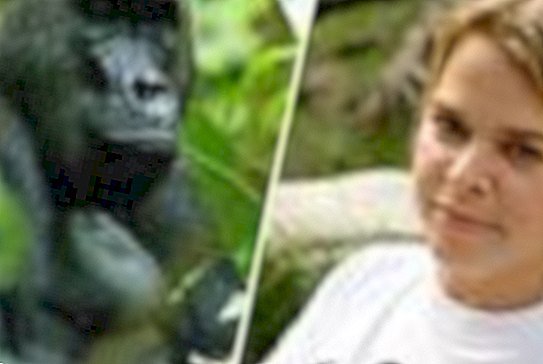Researcher Angelique Todd: "Dead gorillas are considered trophies"

Since 1998, Angelique Todd (41) explores the endangered apes in the African rainforest. In 2007, the biologist took over the gorilla protection project from the environmental organization WWF in the Congo Basin. At the moment the famous gorilla researcher is in Germany. We talked to her about her work.
Photoshow: Angelique Todd and her gorillas

ChroniquesDuVasteMonde.com: For eleven years they have been watching gorillas. How close are you to the animals? Are you accepted by them?
Angelique Todd: Yes, but that's a long process. It lasts about five years. We have been accustomed to the one gorilla group that we are currently exploring and also show our tourists since the year 2000. A second family will be accessible to tourists in a few weeks.
ChroniquesDuVasteMonde.com: And how do you do that?
Angelique Todd: I follow them for the first year, but keep my distance and be very careful. The animals are extremely anxious. In the second year they watch me, in the third year they are often aggressive - they bluff mostly only, but they then want to show me how strong they are. You have to occasionally get to safety, but gently stay tuned. Then the old ones, the silverbacks, start to ignore me. The boys take over the behavior. Only the females continue to cause difficulties.
ChroniquesDuVasteMonde.com: Why the females?
Angelique Todd: They obviously perceive me as a competitor and often react very irritated. They seem to be scared that I'm following their husbands, they're probably worried about their babies or they're afraid that I'll dispute their food. Sometimes they make it really difficult for me to work. Especially since it is like this: If a female attacks me, the male must join in - if it stays calm, she leaves him. Because a male who does not defend her is not a good partner. In that sense, I am also a kind of threat to their partnership.
ChroniquesDuVasteMonde.com: Has it ever been really dangerous for you?
Angelique Todd: Oh yes, a few times. Such a silverback weighs 200 kilos and is ten times stronger than a strong man. You could kill a human. But because they are aware of their strength and such a struggle would cost energy, it usually remains with threatening gestures. But there were already situations, so I thought: So, that's it. It has never happened seriously. However, I always go to the animals in the company of keepers, they are locals who support our work and are well versed in the rainforest - more eyes and ears are always an advantage, there are many dangers lurking there. We must always be very attentive, because even with the gorilla group that knows us well now, it can still be dangerous. For example, if I just walked across the path of a female, there would be trouble.
Video: Angelique Todd and her work with the gorillas

ChroniquesDuVasteMonde.com: And you live directly in the rainforest?
Angelique Todd: Yes, I live in a camp with only a few interruptions for 11 years - 30 kilometers from the nearest town. From there we follow the gorillas every day.
ChroniquesDuVasteMonde.com: Is not that very lonely?
Angelique Todd: No, not at all. There are a number of nice people in the camp. The only thing I miss is: cheese.
ChroniquesDuVasteMonde.com: Describe a normal everyday life.
Angelique Todd: We work in two shifts. The first one starts at 6.30, the second around noon. So we all stay fresh, because the climate and the heat are very tiring. At the camp, of course, we have to take care of everyday things like washing clothes and cooking food. In addition, I'm responsible for our entire tourist program, plan tours, take care of the supply, do the entire administration.
ChroniquesDuVasteMonde.com: An international conference on the protection of gorillas is currently taking place in Germany. How many of these endangered animals are there?
Angelique Todd: That's hard to say. It is often said that there are still 125,000. Normally, gorilla nests are counted if their population is to be recorded. But there are gorillas who do not build a nest - and there are some who build several. I guess there are about 100,000 left.
ChroniquesDuVasteMonde.com: What needs to be done to protect these animals?
Angelique Todd: The biggest threats to gorillas are the Ebola fever, the poaching that often accompanies the deforestation of the rainforest, and the disappearance of their natural habitat. Alone in the last big outbreak of Ebola 5000 of these wonderful animals died. If we do nothing now, there will be no more gorillas in 30 years. That's why Ebola research needs to be pushed forward - especially as people are dying from this disease.In addition, the WWF is committed to preserving the natural habitat of the gorillas, supporting semi-natural wood farming, and running this large conservation project, also to promote soft tourism, and to sensitize people to the survival of their relatives in the rainforest.
ChroniquesDuVasteMonde.com: And what can we do here in Germany to protect the gorillas?
Angelique Todd: Some of the best things you can do is to buy only wood products that come from a responsible timber industry, recognized by the so-called FSC seal (Forest Stewardship Council). For tropical timber without this certification, acres are cut into the rainforest - and they use poachers to kill gorillas. The so-called bush meat is still a huge problem. Killed gorillas are regarded as trophies and as a delicacy - in my eyes this is almost cannibalism, because after all, 98 percent of their genes are identical to ours. Of course, Germans can also help by supporting organizations like the WWF, donate to projects, sponsor our gorillas or book a trip to us. In addition, they should only support governments that are really committed to the environment.
Photoshow: Angelique Todd and her gorillas










